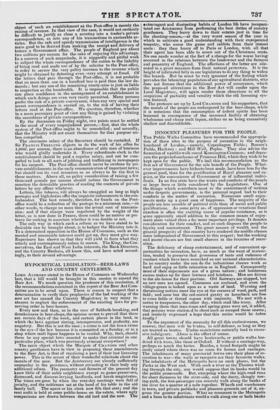HYPOCRITICAL LEGISLATION—BEER-LAWS AND COUNTRY GENTLEMEN.
LORD ALTHORP stated in the House of Commons on Wednesday last, that a bill would be brought in this session to amend the Beer Act. We much question the prudence of this resolution, if the recommendations contained in the report of the Beer Act Com- mittee are to be acted upon. There is reason to suspect that a determination to verify their prophecies of the bad working of the
new act has caused the Country Magistracy in very many in- stances to neglect the enforcement of the existing laws for pre- serving order in beer-houses.
Every now and then, as in the case of Sabbath-breaking, and drunkenness in beer-shops, the opinion seems to prevail that there are certain days of the week, and certain places in the land, in
which the laws against rioting, intemperance, and profanity, are nugatory. But this is not the case ; a crime is not the less a crime in the eye of the law because it is committed on a Sunday, or in a shop where malt liquor happens to be vended. Why, then, should there be any special laws- enacted to make that criminal in one particular place, which was previously criminal everywhere? The main object which the Marquis of CHA WOOS and other country gentlemen have in view in proposing these amendments
to the Beer Act, is that of reaaining a part of their lost licensing
power. This is the secret of their wonderful solicitude about the morals of the poor. But the Aristocracy are already sufficiently
unpopular in the provinces, without attracting to their body any
additional odium. The peasantry and farmers of the present day know little of their noble neighbours except as game-preservers,
distressed, and distress-levying landlords, and harsh magistrates.
The times are gone by when the rent-day meetings were full of jovialty, and the nobleman sat at the head of his table in the old
family hall. The agent or his clerk now fills that seat; and the rent audit is held at some public-house on the estate, where ugly comparisons are drawn between the old lord and the new. The
extravagant and dissipating habits of London life have incapacie tated our Aristocracy from performing the best duties of country gentlemen. They hurry down to their estates just in time for the shooting-season,—at the very worst season of the year in which to cultivate a good understanding with their exasperated tenantry, who curse the game and rabbits from their inmost souls : they then hurry off to Paris or London, with all that their agent has been able to screw out of the Christmas rents. No one needs wonder at the fact of a change for the worse having occurred in the relations between the landowner and the farmers and peasantry of England. The affections of the latter are alie- nated in a great measure from their natural protectors. It is the height of infatuated folly in our legislators to do any thing to widen this breach. But he must be very ignorant of the feeling which pervades the labouring population of our agricultural districts, who does not foresee that the additional power of annoyance, which the proposed alterations in the Beer Act will confer upon the Local Magistracy, will again render them obnoxious to all the suspicions of partiality and venality which the old licensing sys- tem fostered.
The pretence set up by Lord CHANDOS and his supporters, that the morals of the people are endangered by the beer-shops, while it is notorious that the consumption of ardent spirits has been lessened in consequence of the increased facility of obtaining wholesome and cheap malt liquor, strikes us as being excessively shallow and discreditable.
























 Previous page
Previous page